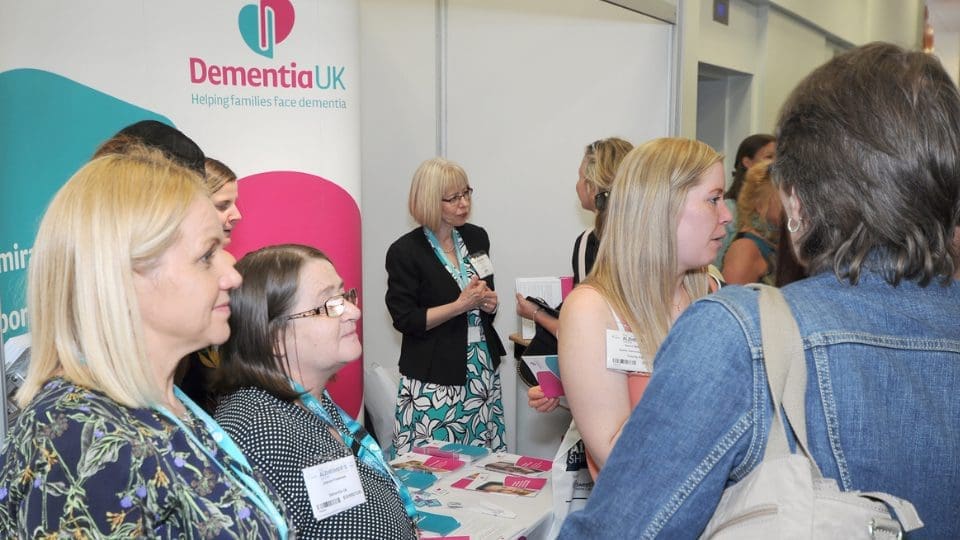
A day in the life of Admiral Nurse Ruby Guild
Ruby talks us through her working day supporting families affected by dementia in local communities.
Women make up a large proportion of callers to Dementia UK’s Admiral Nurse Dementia Helpline – over 70%. With rising cases of dementia and the condition still being so stigmatised, we talked to a couple of our dementia specialist nurses on why there is that imbalance, and the importance of opening up conversations around dementia.
Gary: I’m Gary Burnham-Jones and I provide dementia specialist Admiral Nurse support to families in a clinics-based setting in Eastbourne, East Sussex.
Joe: I’m Joe Costello and I have just joined the Closer to Home Dementia UK and Leeds Building Society service, to improve access to local dementia support. Before that, I was an Admiral Nurse working for 4 and half years out in the community.

Gary Burnham
Gary: I think one of the main barriers is people not recognising that they are unpaid carers, despite supporting people really intensively. It can be tricky for people to take on a caring role, if this is something they’ve never done before in their work or personal life.
Some people might have grown up with different values and are more psychologically aware of their own needs and experiences. Others can have quite entrenched views of what caring means – there‘s a stoicism there which can actually be a barrier to support.
Joe: Not identifying yourself as a carer can have implications on accessing support. It’s the trigger to getting services like respite, which gives people more time to do activities which are meaningful to them. It may also result in accessing financial entitlements, such as the carer’s allowance.

Joe Costello
Joe: Dementia can cause problems in communication, which can then lead to a withdrawal from support networks, or problems with judgement around getting a diagnosis. Frontotemporal dementia for example can result in apathy and disinterest.
We need to appreciate that there is something deeper physiologically going on here. Improving the support that people have from the point of diagnosis and throughout the condition is vital (see our Only Together campaign). It’s also about having services like the Admiral Nurse Dementia Helpline, if you’re worried about symptoms.
Gary: Previously, dementia care services would be associated with activities like bingo and knitting but now there are more activities on offer, including for films, sports and travel. Groups like these can help people continue in their roles and lives by chatting to others with similar interests. Greater awareness and creation of these on a community level is essential, with input from vulnerable people driving these services forward.
Joe: We also need to have a think about the format of these groups as some people may prefer a more 1-2-1 format, or prefer a very specific environment. Perhaps the person would prefer to meet up outside of their home to allow them to speak freely. As dementia specialists, we have an awareness of various needs to allow people to talk as openly as possible.
Dementia UK’s Closer to Home service gives people guidance directly in their own home. Some people mainly use their computers to communicate, so this can be a natural step for them to get the help they need confidentially.
Joe: It’s important to have a diverse pool of people as everyone responds differently to different people. Being a male nurse, some male unpaid carers have said to me that they have felt comfortable opening up to me as there was more connection there.
Conversely, there are other people who may be confused at the fact that I have a nursing role as a man. In these instances, it’s important that they take the fact that I’m a male nurse out of the equation. I’m a person with a specialism around dementia and it’s good for them to know that they can talk to me on that level.
Gary: We also need to remember that as male Admiral Nurses, we can role model the fact that caring skills aren’t confined to one demographic. We can challenge stereotypes a lot more readily.
Gary: It’s ok to ask for help and it doesn’t mean that you’re a failure. Dementia is a complex condition so it’s important to receive expertise on the condition. Often, it’s the first phone call or conversation which can then be the catalyst to accessing more help. Accessing support can reduce the risk of issues snowballing, and people becoming so overwhelmed that they don’t know where to go first.
Joe: Early intervention is key, just so people have the opportunity to talk through how changing relationships can affect them. It’s also about establishing the different connections that people have to each other; one person may be the primary carer but there are secondary and third carers who can get involved in support at home and other activities. As dementia specialists, we can uncover what each family member can provide to support the person, but equally each other.
This piece acknowledges that there is more research which needs to be undertaken around how dementia affects different gender identities and sexes.

Ruby talks us through her working day supporting families affected by dementia in local communities.

The UK’s largest and only event covering all aspects of the fight against dementia from drug discovery to treatment to care is taking place at ExCel from 14th-15th June 2024.

We speak to Admiral Nurse Jules, on why she chose to specialise in young onset dementia and how she supports families.